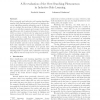Free Online Productivity Tools
i2Speak
i2Symbol
i2OCR
iTex2Img
iWeb2Print
iWeb2Shot
i2Type
iPdf2Split
iPdf2Merge
i2Bopomofo
i2Arabic
i2Style
i2Image
i2PDF
iLatex2Rtf
Sci2ools
SDM
2009
SIAM
2009
SIAM
A Re-evaluation of the Over-Searching Phenomenon in Inductive Rule Learning.
Most commonly used inductive rule learning algorithms employ a hill-climbing search, whereas local pattern discovery algorithms employ exhaustive search. In this paper, we evaluate the spectrum of different search strategies to see whether separate-and-conquer rule learning algorithms are able to gain performance in terms of predictive accuracy or theory size by using more powerful search strategies like beam search or exhaustive search. Unlike previous results that demonstrated that rule learning algorithms suffer from over-searching, our work pays particular attention to the interaction between the search heuristic and the search strategy. Our results show that exhaustive search has primarily the effect of finding longer, but nevertheless more general rules than hill-climbing search. Thus, in cases where hillclimbing finds too specific rules, exhaustive search may help, while in others it may lead to over-generalization.
Computer Science | Exhaustive Search | Powerful Search Strategies | Rule Learning Algorithms | SDM 2009 |
| Added | 07 Mar 2010 |
| Updated | 07 Mar 2010 |
| Type | Conference |
| Year | 2009 |
| Where | SDM |
| Authors | Frederik Janssen, Johannes Fürnkranz |
Comments (0)

